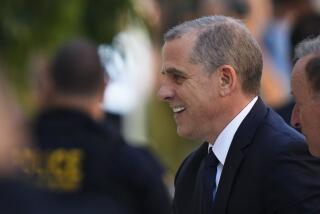Downey Pleads Not Guilty to Drug Counts
- Share via
INDIO — A month after his arrest for alleged drug use and possession at a Palm Springs resort, actor Robert Downey Jr. pleaded not guilty to three drug counts Wednesday in a low-key appearance at a media-packed desert courtroom.
The actor, dressed in black, entered his plea before Riverside County Superior Court Judge B.J. Bjork. After the brief morning hearing, he made his way calmly out of the courthouse escorted by sheriff’s deputies through a throng of news reporters, photographers and cameramen. He made no comment on the case.
“Mr. Downey remains upbeat. He is extremely optimistic,” said Santa Monica attorney Daniel Brookman, one of three lawyers representing the actor. “He is looking forward to moving on with his personal life as well as his legal issues.”
Downey was arrested Nov. 25 at Merv Griffin’s Resort Hotel and Givenchy Spa after an anonymous caller tipped police that the actor was locked in his room with illegal drugs and firearms.
Police searched the room and discovered no weapons but found a pill bottle filled with substances they identified as cocaine and methamphetamine. Downey was charged with two felony counts of possession of cocaine and the tranquilizer diazepam, and one misdemeanor count of being under the influence of a controlled substance.
Downey, an Oscar-nominated actor most recently featured in episodes of the television series “Ally McBeal,” has had a successful screen career repeatedly interrupted over the last four years by bouts with the law.
He was arrested on suspicion of drug possession, driving under the influence and carrying a concealed handgun in 1996, and later pleaded no contest to those charges. Downey was placed on probation and served time in jail and a series of rehabilitation programs in the ensuing years.
After his second probation violation in 1999, however, a Malibu judge sent him to Corcoran State Prison for a year. He was released in August, just three months before his Palm Springs arrest.
Downey is scheduled to appear again in the Indio courtroom Jan. 29 for a hearing at which the district attorney--taking into account the charges, evidence and Downey’s criminal history--will discuss ways to resolve the case with the defense counsel, said Deputy Dist. Atty. Tricia Kelly.
Kelly said Downey could face up to four years and eight months in prison if found guilty of the recent charges. However, he may be eligible for an intensive yearlong outpatient drug program offered through the court, if the actor and his attorneys choose to pursue that option, she said.
Brookman said that the defense team is waiting to receive additional evidence in the case but that he does not anticipate a plea bargain.
“We have not discussed any other alternative, other than to pursue all available legal defenses,” he said.
Los Angeles criminal defense attorney Mark Geragos said Downey’s defense could push to have the case dismissed, arguing that the search of his hotel room was illegal. California case law has determined that an anonymous tip may not justify a search without other cause for suspicion, he said.
The success of such an argument could depend on details of the anonymous call, whether Downey permitted the search and whether prosecutors can show that police conducted it under urgent circumstances.
“I think there’s a significant legal issue as to whether it was a proper search and arrest, and it’s entirely possible that this case gets dismissed,” Geragos said.
As broadcast vans circled the courthouse and journalists hovered around the pale Downey, his attorneys remarked on whether the publicity itself might harm their client’s attempts to remain sober.
“I don’t think the media necessarily helps a person in this situation,” Brookman said.
James Stillwell, executive director of Impact, a Pasadena-based rehabilitation center through which Downey received treatment in 1999, said life in the limelight might complicate recovery from drug addiction.
Thicker wallets may give celebrities easier access to drugs, he said. And their ability to hire top attorneys can obscure the legal consequences of drug abuse, allowing stars to remain cavalier about getting caught.
Still, he said, those advantages won’t shield Downey from the ultimate results of his alleged relapse.
“There always comes a time when all the money and all the resources don’t factor in,” he said. “And ultimately, everybody--celebrities and everybody else--will be faced with the same three consequences of repeated drug abuse. That is: jail, institutions or death. The disease does not respect celebrity or wealth or geography.”
More to Read
Sign up for Essential California
The most important California stories and recommendations in your inbox every morning.
You may occasionally receive promotional content from the Los Angeles Times.










